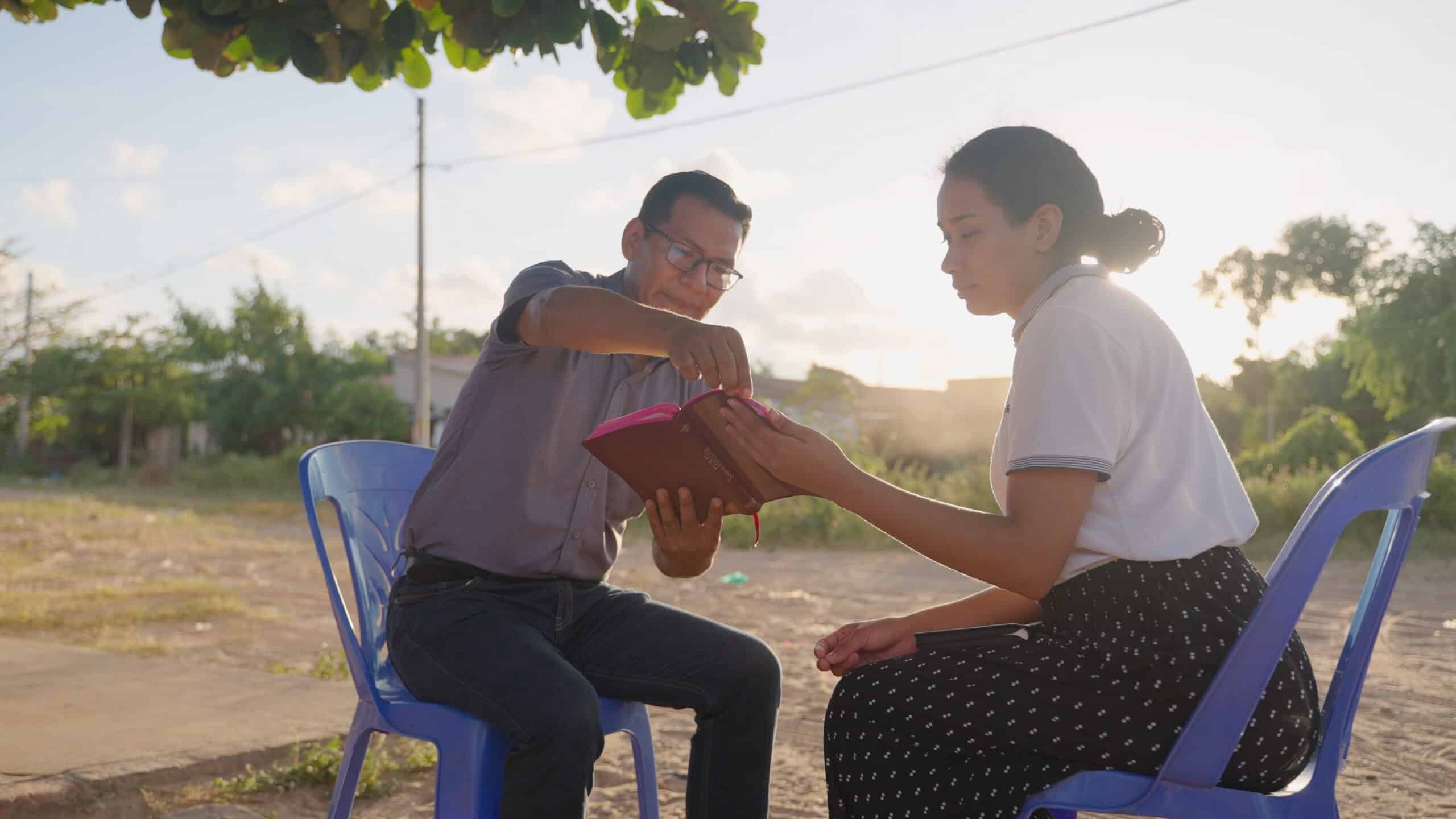
Spiritual disciplines are practices we follow that help us grow spiritually, bringing us closer to our heavenly Father. Jesus practiced many spiritual disciplines in the Bible. As believers, we should follow in his footsteps. When we do, we’ll get to experience so much more of our Savior, building a life-changing relationship with him.
Here, you’ll learn what spiritual disciplines are and why they’re important. You’ll learn from Jesus’ example and see seven disciplines that can enhance your walk with him.
What’s included on our spiritual disciplines list?
What Are Spiritual Disciplines?
The word “discipline” has many meanings. You might be most familiar with discipline as a verb that means correcting bad behavior. But as a noun, a discipline is a practice that we do regularly as a way of training our minds, bodies and spirits.
So spiritual disciplines are practices, such as praying and Bible reading, that we do regularly as training to improve our spiritual well-being. Spiritual disciplines become good habits that bring us closer to God.

Check this out: Remember Peter, John and Matthew? Maybe Judas? These were some of Jesus’ 12 disciples. Notice how “disciple” and “discipline” are so similar? In Greek, the word for “disciple” is mathetes, which means “a learner” or “a student.”
The disciples walked closely with Jesus and learned from his example. Jesus trained them in the ways of God and helped them grow spiritually.
We can allow Jesus to do the same for us by following the spiritual disciplines he practiced and taught his followers.
Why Are Spiritual Disciplines Important?
There’s yet another meaning of the word “discipline” you should know. We can also have self-discipline. Having self-discipline (or self-control, a Fruit of the Spirit) as a Christian means being able to control our actions and behaviors so we can follow Jesus and love others, even when it’s hard.
And how can we do that? By following spiritual disciplines! Putting spiritual disciplines into practice in our day-to-day lives helps us build self-control, draws us nearer to Christ and helps us keep our eyes on the prize that is Jesus.
7 Spiritual Disciplines to Follow
1. Prayer
Very early in the morning, while it was still dark, Jesus got up, left the house and went off to a solitary place, where he prayed. — Mark 1:35, NIV
Prayer was an important part of Jesus’ daily life. Many times throughout Scripture we find him praying. For example, Jesus prayed in the Garden of Gethsemane (Matthew 26:36-56) before he went to the cross. He even took the time to teach his disciples how to pray (Luke 11:1-13).
If prayer was important to Jesus, it should be important to us. Jesus knew that prayer kept him connected to his Father. It does the same for us! Prayer trains us to connect with God, helping us grow closer to him.
Just as you would with a best friend, talking to God helps us build a lasting relationship with him. Not sure how to pray? Keep it simple! God simply wants to hear from you. Don’t worry about using pretty phrases and poetry. Instead, talk to him like you would a friend.
Related Read: What to Pray For: 7 Powerful Prayers for Day-to-Day Life

2. Bible Reading
All Scripture is God-breathed and is useful for teaching, rebuking, correcting and training in righteousness, so that the servant of God may be thoroughly equipped for every good work. — 2 Timothy 3:16-17, NIV
One of the goals of following spiritual disciplines is learning how to be righteous. That means living right with God. And how do we learn what it means to be righteous? Just like 2 Timothy says, we must dive into God’s Word, the Bible.
God loves us so much that he gave us his Word to guide us in righteousness, no matter what life throws our way. The Bible is our training manual, helping us understand what it means to live righteous lives.
- Want to know if something’s a sin? Galatians 5:19-21.
- Want to know how to be forgiven of your sins? 1 John 1:9.
- Want to know what to do when faced with a decision? Proverbs 3:5-6.
- Want to know how to resolve conflict with a friend? Ephesians 4:31-32.
- Want to know what to do when you’re anxious? Philippians 4:6-7.
These are just a few examples of how the Bible can guide you in your walk with Jesus. Each day, make it a point to read your Bible. Follow a Bible reading plan. Read a devotional. Or simply do a quick online search for Bible verses about a topic you’re dealing with.
Related Read: 17 Best Christian Podcasts to Bring You Closer to Jesus

3. Spending Time With Others
And let us consider how we may spur one another on toward love and good deeds, not giving up meeting together, as some are in the habit of doing, but encouraging one another — and all the more as you see the Day approaching. — Hebrews 10:24-25, NIV
The book of Hebrews is believed to have been written by Paul. And in this passage, Paul instructs Christians within the Church to stick together, encouraging one another. Why? It’s really hard to walk the path toward Jesus alone.
The thing is, God never intended for us to go it on our own. From the beginning, God brought humans together, just like Adam and Eve (Genesis 2:18-24). Even Jesus surrounded himself with friends and family.
We need other Christians to encourage us when we’re down. To speak truth when we need to hear it. To lift our arms when we’re too tired to fight on our own, just like Aaron and Hur did for Moses (Exodus 17:12-14).
Surround yourself with others who are also following Jesus. Join a local church. Get involved in a small group. Start a Bible study. As you surround yourself with Christian friends, you’ll “spur one another on” spiritually, growing together.

4. Fasting
Then Jesus was led by the Spirit into the wilderness to be tempted by the devil. After fasting forty days and forty nights, he was hungry. The tempter came to him and said, “If you are the Son of God, tell these stones to become bread.” — Matthew 4:1-3, NIV
In Matthew 4, Jesus fasted for 40 days and 40 nights. When you “fast,” you don’t eat or drink for a specific time. After 40 days and nights, you can imagine just how hungry Jesus would’ve been.
When Jesus’ body was at its weakest point, Satan came to tempt him. He tempted him with bread and even tried to give Jesus all the kingdoms of the world (Matthew 4:8-9). But although Jesus’ body was weak, his spirit was strong, and he resisted Satan’s temptations.
This is what fasting can do for us too. Fasting trains us to turn to prayer and the Word to sustain us instead of food and other things. We turn our focus to God and spiritual things instead of what our flesh needs, strengthening our spirits.
If you’ve ever felt as if your spirit is weak, try giving something up. And it doesn’t necessarily have to be food. For example, fast social media for a week and instead pray and read the Bible. Fasting teaches you how to put Jesus first and rely on him — a critical lesson to learn when following him!

Photo by: Galia Oropeza
5. Rest
“Come to me, all you who are weary and burdened, and I will give you rest. Take my yoke upon you and learn from me, for I am gentle and humble in heart, and you will find rest for your souls. For my yoke is easy and my burden is light.” — Matthew 11:28-30, NIV
Following Jesus isn’t always easy. At times, we might find ourselves feeling worn down. Why? As humans, we often think we can do everything in our own strength. We serve in church. We serve our families. We say yes to this and yes to that. We strive, running ourselves ragged, trying to do all the good works. We work hard to perform well.
We focus only on what we can do for Jesus instead of what he’s already done for us.
Here’s some truth: Jesus never asked us to perform well to impress him. In fact, there’s nothing we could do to earn his love or even salvation. He loved us first and does so now unconditionally. It’s why he sacrificed his life for ours.
Jesus’ yoke is easy, and his burden is light. He wants us to rest in him, not continuously strive to try and earn his love. We already have it. When we rest in Jesus, it trains our mind and spirit to trust in Jesus instead of ourselves or what we can do. And that’s life-changing!
But how do we rest in Jesus?
- Turn to him first. When life gets hard or we just need a moment of peace, we should go to Jesus through prayer and worship. He promises to give us rest when we go to him.
- Speak his truth into every situation. In those moments of anxiety or fear, when our peace and rest are threatened, we should speak the truth of his Word. Open the Bible and read Scripture. Look up Bible verses about your struggle and read them out loud. Speaking the truth helps you turn your thoughts from your situation and refocus on Jesus.

6. Worship
Give thanks to the Lord, for he is good; his love endures forever. — 1 Chronicles 16:34, NIV
Worship is a spiritual discipline that enables us to proclaim the truth of who Jesus is in our lives. He’s our Savior, our King and our Provider!
Worship is our way of saying “thank you” to Jesus for all that he’s done for us. It trains us to practice gratitude. And as we worship Jesus, we turn our focus to him instead of ourselves, drawing closer to him.
There are many ways to spend time in worship. You can sing, kneel or lift your hands. You can paint, draw, write or dance. Whatever helps you joyfully reflect on who Jesus is and what he’s done for you is worship! It isn’t one-size-fits-all; you should feel free to worship Jesus in your own way.

7. Generosity
Carry each other’s burdens, and in this way you will fulfill the law of Christ. — Galatians 6:2, NIV
In this Scripture, Paul instructs the Church to care for each other by bearing each other’s burdens. After all, this is exactly what Jesus did for us on the cross. He bore our sin so we could be righteous in his sight.
Jesus loved us so much that he was willing to give up everything, including his life, for us. He is the perfect picture of what it means to be generous. And now, he’s calling us to follow the spiritual discipline of generosity too, bearing the burdens of others despite what it might cost us.
Being generous is a way of trusting Jesus with our finances and time. It trains us to remember that everything we’ve been given is a gift from God. We’ll never be able to show the same generosity Jesus did. But we can give freely of what we do have to those in need, such as those living in extreme poverty.
Recently, Compassion President and CEO Santiago “Jimmy” Mellado met with John Mark Comer of Practicing the Way to discuss generosity on the Rule of Life Podcast. Here’s what he had to say:
“When people are confronted with the great levels of poverty that are in the world locally, nationally and globally, there’s two responses. Either you look away or you lean in.” — Santiago “Jimmy” Mellado
Jesus didn’t look away from us when we were suffering in sin. He chose to lean in, seeing our distress and need and moving to stop it. We can do the same by giving generously too!
Here are some ways you can lean in, practicing the spiritual discipline of generosity by caring for those in need:
- Give your time: Even if you don’t have the means to give financially, you can still be generous with what you do have. Volunteer your time at a local food bank or shelter. Or volunteer to support a charity organization.
- Give to a cause: Maybe you want to help a family receive relief after disaster. Or maybe you’d like to ensure a child receives critical medical care. Giving to a specific cause enables you to help someone in desperate need, offering them care they wouldn’t otherwise receive.
- Sponsor a child: Spiritual disciplines should be practiced regularly to help you grow closer to God. Child sponsorship empowers you to practice generosity regularly through a monthly donation to a child living in poverty. By becoming a sponsor, you’ll help introduce a child to Jesus and provide the love and care they need to journey out of poverty.
Grow Closer to God Through Giving
Will you look away or lean in? Practice the spiritual discipline of giving by providing love and care to a child in need.








0 Comments |Add a comment